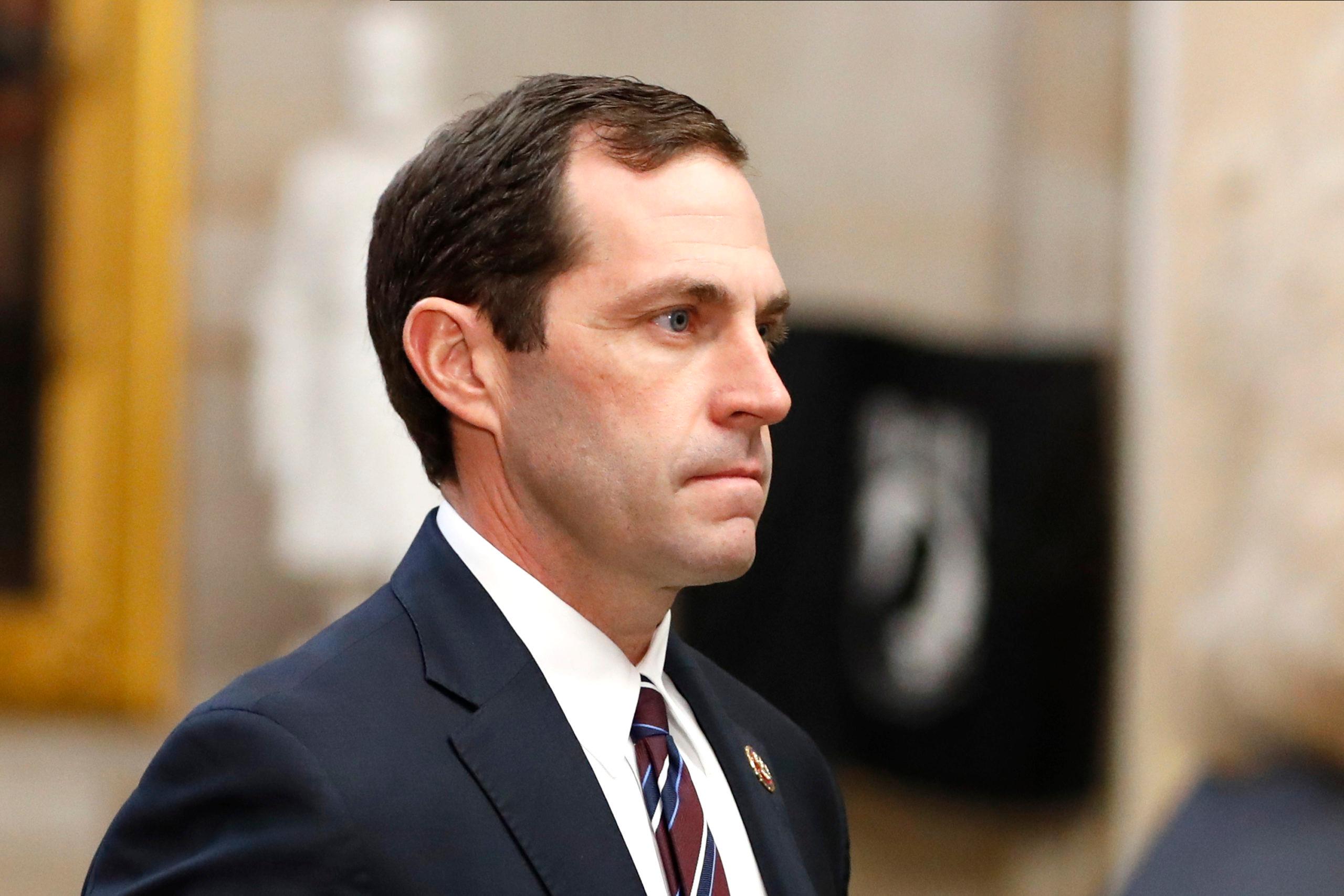
Democratic Rep. Jason Crow of Aurora says if Russia does invade Ukraine, the U.S. would not put troops in direct conflict.
President Joe Biden has already committed 3,000 American troops to areas of eastern Europe, but Crow said their role is to support and train Ukrainian forces in the event of an invasion. The Pentagon has also put 8,500 troops on heightened alert of readiness to deploy to the area, including elements from the 4th Infantry Division stationed in Fort Carson.
Crow is a former Army Ranger and a member of the House Intelligence and Armed Services committees; he led a congressional delegation to Ukraine in December.
The country cannot get used to forever wars, Crow said, citing how the U.S. just ended the prolonged conflict in Afghanistan last year. He also said that Russian aggression toward Ukraine was important to Coloradans because threats to democracy in the world are a threat here as well.
The congressperson spoke to Nathan Heffel on Colorado Matters.
This interview has been edited for clarity and length.
Nathan Heffel: You went to Ukraine in December as part of a congressional delegation trip. What did you see while you were there?
Congressman Jason Crow: I led a congressional delegation, a bipartisan delegation of members of the House Intelligence Committee on which I sit. We met with senior defense officials and intelligence officials in Ukraine. And what we saw was a very dire situation back in December. It has only gotten worse since then; The risk to Ukraine is very real. I think we have a very real responsibility to make sure that we are defending nascent democracies, democracies that are trying to establish themselves and to join the free world. That's really what this is about. It's about Russia threatening to take by force a democracy. And I don't think we should allow that to happen.
Nathan Heffel: Why should Americans care about this?
Congressman Crow: There are a lot of reasons why Americans and Coloradans should care about this. First of all, it matters when the U.S. engages in the world. Freedom and democracy matter, and a threat to freedom and democracy anywhere is a threat to democracy everywhere. We obviously have our own challenges at home that we are working on addressing, but that doesn't mean that we stop engaging with the world and defending democracy around the world.
Secondly, stability matters for our economy. Making sure that we don't have war in Europe is really important for our economy, and for our European partners and for our trading partners. So there's a very real economic connection here as well.
The third is: this will not be limited to just Eastern Europe and Ukraine. There are dictators and autocrats around the world who are looking very closely at how democratic nations and NATO respond to this. If we allow this to happen without consequence, we can expect a lot more of it to happen around the world.
Heffel: After your trip, you tweeted that the U.S. should expedite and expand shipments of defensive weapons and equipment, and bolster Ukraine's cyber defenses. The U.S. has been doing this, and hundreds of thousands of pounds of munitions have been sent. President Biden has committed 3,000 military personnel to areas of Eastern Europe who could be deployed in days. Won't Russia see this as an escalating threat that negates any diplomatic efforts seen so far?
Congressman Crow: No, Russia will not. Vladimir Putin will not see this as an escalation. It is Putin who has escalated the situation so far. He has already amassed 100,000 troops along the border. It's very likely that an invasion will occur. What we're doing is we're showing that that will not be without consequence, that NATO will stand strong, that the reinforcement sent in will reinforce the Eastern flank and what will actually happen is that this will have the opposite effect of what Putin thinks will happen. It will actually reinforce our alliance, it will actually double down on our international security arrangements and our NATO partnership, not make it weaker. So I think showing that resolve remains very important here.
Heffel: You have advocated for sanctions should Russia invade. What do those look like? And is there a line for you regarding the scale of the invasion, meaning the level of sanctions depends on a small incursion versus a large-scale attack into Ukraine by Russia?
Congressman Crow: There are a lot of things that we have to do to respond. We've sent defensive munitions and equipment into Ukraine. We've done training of the Ukrainian military in the past. We are reinforcing our NATO allies along the Eastern flank. We are bolstering cyber defenses of our partners and our allies. At the same time, we have to make sure that we're preparing sanctions packages that we will not allow an autocrat to take by force a free and democratic sovereign nation.
We have made it very clear in the house, and they're negotiating a package in the Senate, that any further aggression by Russia will be met with substantial economic consequences and inflict a lot of pain on Vladimir Putin and his cronies.
Heffel: What kind of sanctions?
Congressman Crow: You look at energy sanctions. You look at sanctions in the banking sector: so, hitting some of the major Russian banks. But, sanctions on Vladimir Putin himself and on the oligarchs that support him (he has support from oligarchs in the oil and gas industry). It's largely a petrol-based oil and gas economy in Russia, so hitting that economy very hard is going to be really important. Also on the Nord Stream 2 pipeline into Germany. We are negotiating with Germany and our other allies right now to make it really clear that that pipeline will be shut down and it will not happen if Russia were to invade Ukraine.
Heffel: But won't those sanctions also affect NATO member nations who depend on Russia for oil and gas?
Congressman Crow: Well, that's part of the problem here and that's one of the reasons we've been pushing Germany and others for years to reduce their dependence on Russia. I mean, Russia is an 80-plus percent petrol-based economy, but they don't have that economy without customers and Europe is a big part of that. So, we're continuing to push Europe and our partners to divest of that dependence on oil and fossil fuels coming from Russia.
Frankly, it's really important from the climate perspective, as well. To address the climate crisis, we need to be divesting and moving away from those energy sources anyhow. But definitely it is important now from an economic and national security perspective.
Heffel: I want to talk about the U.S. committing more troops here. If Ukraine is invaded further by Russia, should the U.S. commit more troops to that area?
Congressman Crow: The president has made it really clear — and I agree with this — there will be no U.S. troops in conflict. We're not going to be in a situation where, with a pure adversary like Russia, we're going to be getting into a shooting war. That's not going to happen. We will support the Ukrainians. We will support our partners and allies with equipment and supplies and training and other types of support, but we are not going to send troops into harm's way.
The bolstering of the defenses are at the invitation of our NATO allies: Poland, Romania and others who have asked for additional reinforcement that send a message that the NATO partnership is strong and we are committed to it. This is a temporary increase in troops, rotational forces into Eastern Europe. But hopefully it will not be a long-term increase in rotational forces.
Heffel: So then is our military role largely training and bolstering, and not troops physically on the ground in Ukraine?
Congressman Crow: We are not going to put combat troops on the ground in Ukraine. That's not a part of the plan; The president has been very clear on that. The increase in troops of about 3,000 right now, and there are about 8,800 that have been put on alert in the United States. We're sending 3,000 separate troops to bolster Romania and Poland and Germany. These are forces that conduct maneuvers and training and do other things with their allied forces there.
Heffel: What is Congress' role in this situation? What is your role in this situation beyond what the president is saying and the actions he's taking?
Congressman Crow: It's to support the security aid and the packages that have been sent to Ukraine. That's money that has to be appropriated, so making sure that that's happening.
I sit on both the House Intelligence Committee and the Armed Services Committee. Those are the two primary committees that have oversight over that security assistance and those packages.
[My role is] also to communicate this with the broader public and be really clear what our interests are, and what we're willing to do and what we're not willing to do as a nation. I'm somebody who has long said we can't be a nation that's used to perpetual war. We just ended our nation's longest war last year. Making sure that we're reigning in many of our conflicts around the country and not expanding those is of primary interest to me and many of the people that I represent.
Heffel: I've seen that much of the country feels wary about getting involved in another conflict overseas. Congressman, do you think that war between Russia and Ukraine is imminent?
Congressman Crow: I wouldn't use the word imminent. Imminent means different things to different people. I don't think it's inevitable; I think it's very likely. But there's only one person in the world that knows whether or not it's going to happen, and that's Vladimir Putin. I think he has put all the pieces into place to do it. At the end of the day, it will be his decision and his decision alone. That's how Russia works.
Heffel: What do you take from the most recent comments by Vladimir Putin saying that this is simply the U.S. goading Russia into invading Ukraine?
Congressman Crow: I say it's absurd. A NATO country has never invaded Russia. We're not the aggressor here; It is Russia that's the aggressor. It's Russia that has invaded Donbas and Crimea, and that has put 100,000 troops on the border of a free and sovereign democratic nation. So, that's what's happening here: the attempt by Vladimir Putin to flip the script and say that it's NATO that's the aggressor or posing security challenges to Russia is just not grounded in reality and the facts. But that's how Vladimir Putin works: he tries to create pretext and he tries to create excuses to do something that he wants to do anyhow.
But we're certainly not going to allow him to do that. That includes false flag operations, which we are greatly concerned about — him mounting operations that would make it look like there was an attack by Ukraine. But certainly that's not in Ukraine's interest, or the U.S. interest or NATO interest to do something like that. We're going to be very vigilant to that type of threat.








